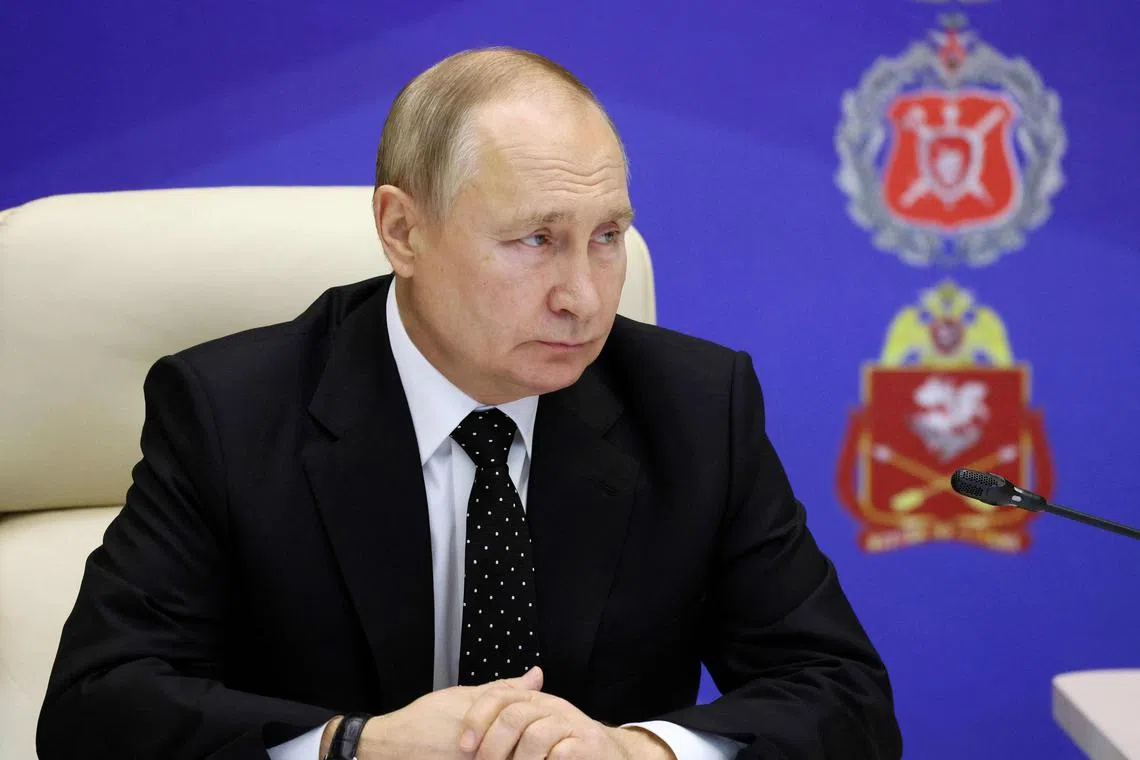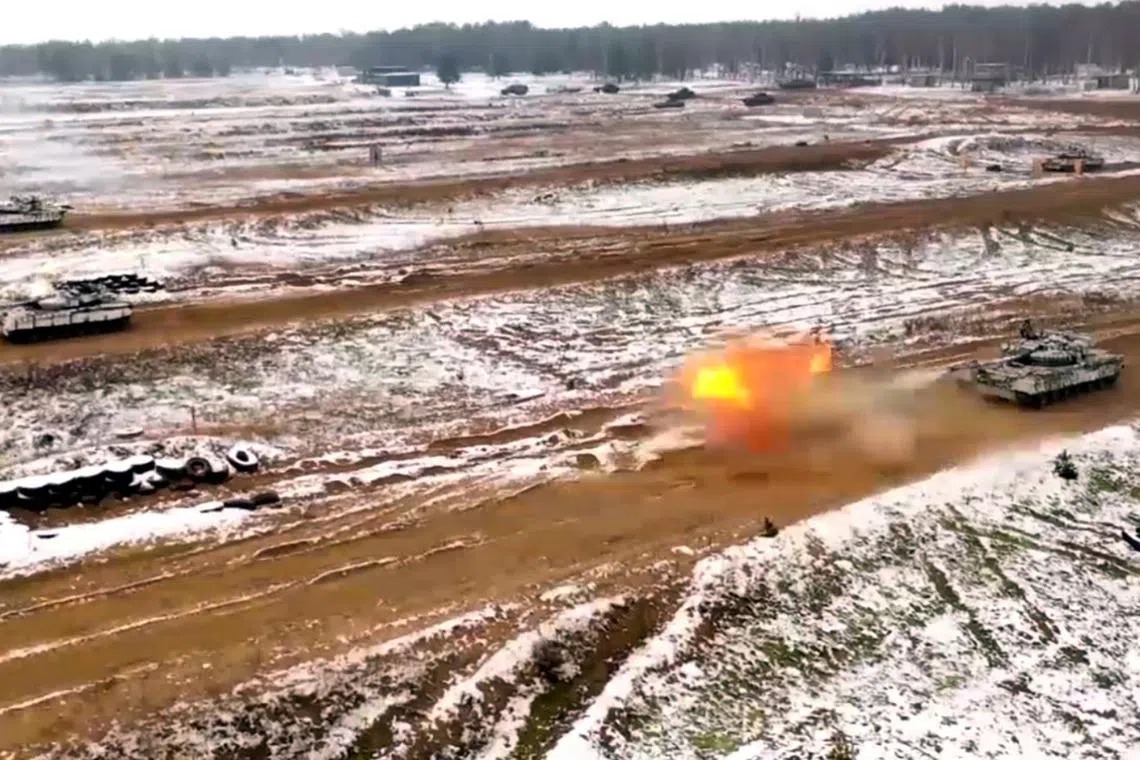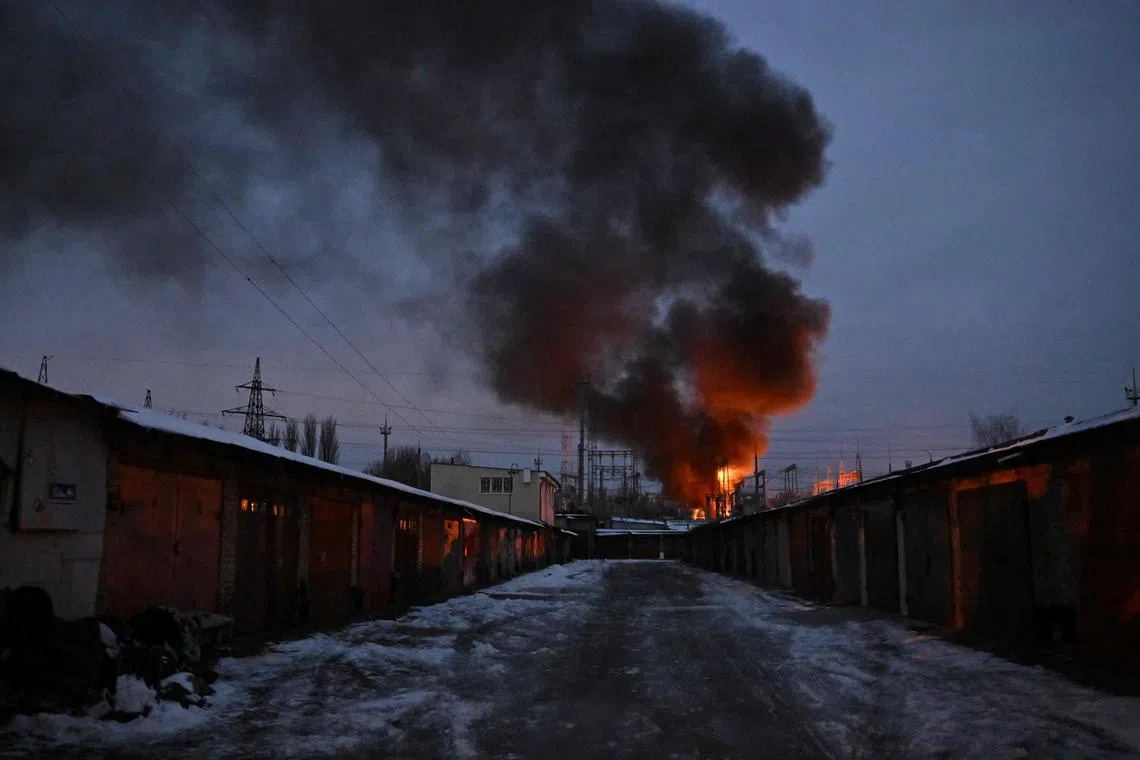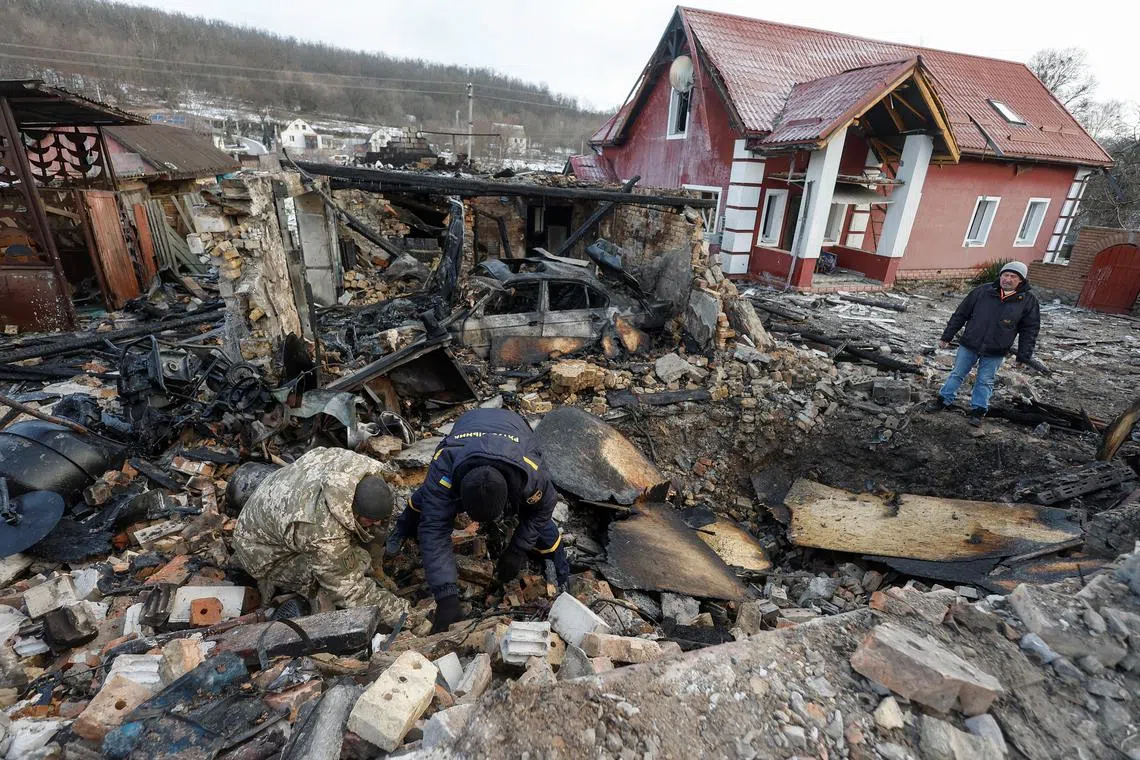Putin lands in Belarus for talks amid fears of new assault on Ukraine
Sign up now: Get ST's newsletters delivered to your inbox

The Kremlin has described Russian President Vladimir Putin's visit as a broad “working visit”.
PHOTO: AFP
KYIV - Russian President Vladimir Putin visited Belarus on Monday along with his defence and foreign ministers.
The trip has fanned fears in Kyiv that he intends to pressure his ex-Soviet ally to join a fresh ground offensive that would open a new front against Ukraine.
Mr Putin’s troops have been driven back in Ukraine’s north, north-east and south since invading the country in February
He is taking a more public role in the war.
Mr Putin visited his operation headquarters last Friday to sound out military commanders.
His trip for talks with Belarusian President Alexander Lukashenko was his first to Minsk since 2019.
That was before the Covid-19 pandemic and a wave of pro-democracy protests in 2020
Russian forces used Belarus as a launch pad for their abortive attack on the Ukrainian capital Kyiv in February, and there has been Russian and Belarusian military activity there for months.
Kremlin spokesman Dmitry Peskov told Russian news agencies that Belarus was Russia’s “number one ally”.
But he said suggestions Moscow aims to pressure Minsk into joining what it calls its “special military operation” were “stupid and unfounded fabrications”.
Ukrainian joint forces commander Serhiy Nayev had said he believed the talks would address “further aggression against Ukraine and the broader involvement of the Belarusian armed forces in the operation against Ukraine, in particular, in our opinion, also on the ground”.
Ukraine’s top general, Valery Zaluzhniy, told the Economist last week that Russia was preparing 200,000 fresh troops for a major offensive that could come from the east, south or even from Belarus as early as January, but more likely in spring.
Moscow and Minsk have set up a joint military unit in Belarus and held numerous exercises.
Three Russian warplanes and an airborne early warning and control aircraft were deployed to Belarus last week.
But Mr Lukashenko has repeatedly said Belarus will not enter the war in Ukraine. Foreign diplomats say committing Belarusian troops would be deeply unpopular at home.
Sanctions
Already, Western sanctions have made it hard for Belarus to ship potash fertilisers, its top export, via Baltic ports.
Western military analysts say Mr Lukashenko’s small army lacks the strength and combat experience to make a big difference.
But by forcing Ukraine to commit forces to its north, it could leave it more exposed to Russian assaults elsewhere.
The Pentagon said on Dec 13 that it did not see “any type of impending cross-border activity by Belarus at this time”.
Russian troops that moved to Belarus in October
It was not immediately clear when and where in Belarus the latest in a flurry of recent exercises will start.
“Protecting our border, both with Russia and Belarus - is our constant priority,” Ukrainian President Volodymyr Zelensky said after a meeting on Sunday of Ukraine’s top military command. “We are preparing for all possible defence scenarios.”

Russian forces taking part in a joint military drill with Belarus’ Army at an undisclosed location in Belarus.
PHOTO: AFP
Air raids
On Monday, Russian air raids hit “critical infrastructure” in and around Kyiv,
Kyiv’s mayor said preliminary information suggested there were no deaths or injuries from the attack on the capital.
He added that medics were working at the sites of the strikes in the Solomyanskyi and Shevchenkivskyi districts.
“As a result of the attack on the capital, critical infrastructure facilities were damaged,” Mayor Vitali Klitschko said on the Telegram messaging app.
Mr Zelensky on Sunday again called for Western nations to beef up Ukraine’s air defences after weeks of Russian air strikes targeted the energy network amid sub-freezing temperatures.

Smoke rising from part of Kyiv’s power infrastructure after a drone attack on Dec 19, 2022.
PHOTO: AFP
Several loud blasts were heard on Monday.
But it was not immediately clear whether they were air defence systems destroying the drones or drones hitting their targets.
Emergency power cuts were re-introduced in Kyiv
The 10-month-old conflict in Ukraine is the biggest in Europe since World War II.
It has killed tens of thousands of people, driven millions from their homes and reduced cities to ruins.
Mr Zelensky told Ukrainians the armed forces were holding firm in the town of Bakhmut - scene of the fiercest fighting for many weeks as Russia attempts to advance in eastern Ukraine’s Donetsk region.
“The battlefield in Bakhmut is critical,” he said. “We control the town even though the occupiers are doing everything so that no undamaged wall will remain standing.”
Denis Pushilin, Russian-installed administrator of the portion of the Donetsk region controlled by Moscow, said that Ukrainian forces shelled a hospital in the Donetsk city, killing one person and injuring several others.
Reuters could not independently verify the battlefield accounts.

Investigators working at the site of a house that was damaged during a Russian drone strike, in the village of Stari Bezradychi, in Ukraine’s Kyiv region, on Dec 19, 2022.
PHOTO: REUTERS
Kissinger calls for negotiation
Mr Putin casts what he calls Russia’s “special military operation” in Ukraine as a watershed moment when Moscow finally stood up to the Western bloc, led by the United States, seeking to capitalise on the 1991 fall of the Soviet Union by destroying Russia.
Kyiv and the West say Mr Putin has no justification for what they have decried as an imperial-style war that has resulted in Russia now controlling around a fifth of Ukraine.
Moscow said on Monday Russian and Chinese forces would hold joint naval drills
While the drills have been held annually since 2012, Moscow has sought to strengthen its political, security and economic links with Beijing in recent months and sees Chinese President Xi Jinping as a key ally in an anti-West alliance.
Henry Kissinger, 99, an architect of the Cold War policy of detente towards the Soviet Union and China as US secretary of state in the 1970s, said it was time for a negotiated peace in Ukraine
“The time is approaching to build on the strategic changes which have already been accomplished and to integrate them into a new structure towards achieving peace through negotiation,” Mr Kissinger wrote in The Spectator magazine.
Ukraine rejected the proposal, saying it amounted to appeasing the aggressor.
“All supporters of simple solutions should remember the obvious: any agreement with the devil - a bad peace at the expense of Ukrainian territories - will be a victory for Putin and a recipe for success for autocrats around the world,” Ukrainian presidential aide Mykhailo Podolyak said on Telegram.
There are no peace talks currently under way. REUTERS


